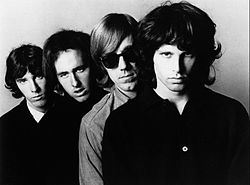Lyrics and recording
In a 1969 interview with Jerry Hopkins, Morrison said about the lyrics:
[E]very time I hear that song, it means something else to me. I really don't know what I was trying to say. It just started out as a simple goodbye song ... Probably just to a girl, but I could see how it could be goodbye to a kind of childhood. I really don't know. I think it's sufficiently complex and universal in its imagery that it could be almost anything you want it to be. [10]

When interviewed by Lizze James, he pointed out the meaning of the verse "My only friend, the End":
Sometimes the pain is too much to examine, or even tolerate ... That doesn't make it evil, though –or necessarily dangerous. But people fear death even more than pain. It's strange that they fear death. Life hurts a lot more than death. At the point of death, the pain is over. Yeah –I guess it is a friend. [11]
Shortly past the midpoint of the nearly 12-minute-long album version, the song enters a spoken word section with the words, "The killer awoke before dawn / he put his boots on". That section of the song reaches a dramatic climax with the lines, "Father / Yes son? / I want to kill you / Mother, I want to ..." (with the next words screamed out unintelligibly). [12] Morrison had worked on a student production of Oedipus Rex at Florida State University. [8] Ray Manzarek, the former keyboard player of the Doors, explained:
He was giving voice in a rock 'n' roll setting to the Oedipus complex, at the time a widely discussed tendency in Freudian psychology. He wasn't saying he wanted to do that to his own mom and dad. He was re-enacting a bit of Greek drama. It was theatre! [13]
When asked whether the lyrics of the Oedipal section actually resonated with his own parents, Morrison defensively replied, "I don't want to talk about it. I don't want to involve anyone unless they want it." [10] On the other hand, Doors' guitarist Robby Krieger believed that Morrison indeed suffered "from an apparent Oedipus complex". [14] However, in John Densmore's autobiography Riders on the Storm, he recalls when Morrison explained the literal meaning of the song:
At one point Jim said to me during the recording session, and he was tearful, and he shouted in the studio, 'Does anybody understand me?' And I said yes, I do, and right then and there we got into a long discussion and Jim just kept saying over and over kill the father, fuck the mother, and essentially boils down to this, kill all those things in yourself which are instilled in you and are not of yourself, they are alien concepts which are not yours, they must die. Fuck the mother is very basic, and it means get back to essence, what is reality, what is, fuck the mother is very basically mother, mother-birth, real, you can touch it, it's nature, it can't lie to you. So what Jim says at the end of the Oedipus section, which is essentially the same thing that the classic says, kill the alien concepts, get back reality, the end of alien concepts, the beginning of personal concepts. [15]
According to Mojo magazine, [16] during the recording sessions, Morrison was obsessed and skeptical of the words, "Fuck the mother, kill the father", as Krieger recalled, "He was on this Oedipus complex trip." [17] Then he accidentally threw a TV, which was brought in by sound engineer Bruce Botnick, at the control room window. [18] After the incident, he was sent home by producer Paul A. Rothchild. However, Morrison, who had taken LSD, returned in the middle of the night, broke into the studio and hosed it with a fire extinguisher. [19] The extinguishing agent marked only the instruments that were mounted in the recording place. [18] Rothchild came back and advised the studio owner to charge the damage to Elektra. [16]
The genesis and the use of the word "fuck" is described by Michael Hicks as follows:
During this period, Morrison brought vocal ideas into the instrumental solo section. Between the organ and guitar solos he approached the microphone and intoned two brief lines from the middle of the song "When the Music's Over": "Persian night, babe / See the light, babe." More strikingly, when the retransition motive began, he held the microphone against his mouth and screamed the word "fuck" repeatedly, in rhythm, for three measures or more (the barking sound that one hears during this passage on most live recordings). This was probably not a spontaneous vulgarism, but rather, a kind of quotation from another Doors song, "The End." Paul Rothchild explains that in the Oedipal section of the studio recording of "The End," Morrison shouted the word "fuck" over and over "as a rhythm instrument, which is what we intended it to be." That "rhythm instrument" was buried in the studio mix of "The End." Now, forcefully superimposed on "Light My Fire", it shocked many a fan who had come to hear the group's most famous song. [20]
The Pop Chronicles documentary reports that critics found the song "Sophoclean and Joycean." [12]
"The End" was recorded live in the studio with no overdubbing. [21] Two takes were recorded, with reportedly the second being used for the album. [16] It was one of the last songs performed by the original group at their last concert on December 12, 1970, at The Warehouse in New Orleans.
